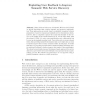852 search results - page 13 / 171 » Comparing relevance feedback algorithms for web search |
CIKM
2008
Springer
14 years 11 months ago
2008
Springer
Relevance feedback has been demonstrated to be an effective strategy for improving retrieval accuracy. The existing relevance feedback algorithms based on language models and vect...
73
Voted
CIKM
2009
Springer
15 years 4 months ago
2009
Springer
Eye tracking experiments have shown that titles of Web search results play a crucial role in guiding a user’s search process. We present a machine-learned algorithm that trains ...
115
Voted
SIGIR
2011
ACM
14 years 13 days ago
2011
ACM
Pseudo-relevance feedback has proven effective for improving the average retrieval performance. Unfortunately, many experiments have shown that although pseudo-relevance feedback...
78
Voted
AI
2008
Springer
15 years 4 months ago
2008
Springer
Abstract. Conventional web search engines retrieve too many documents for the majority of the submitted queries; therefore, they possess a good recall, since there are far more pag...
SEMWEB
2009
Springer
15 years 4 months ago
2009
Springer
State-of-the-art discovery of Semantic Web services is based on hybrid algorithms that combine semantic and syntactic matchmaking. These approaches are purely based on similarity m...



